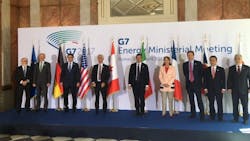G7 Commits to Advancing Global Energy Storage and Phasing Out Unabated Coal and Harmful Non-CO2 Pollutants
At the G7 Ministerial Meeting on Climate, Energy, and the Environment in Turin, Italy, energy and climate leaders reached a consensus on a variety of energy and climate that outline ambitious actions following the energy outcomes from COP28 in Dubai in December 2023.
The G7 is an intergovernmental forum of major economies and democratic allies, consisting of Canada, France, Germany, Italy, Japan, the UK, and the US. The group's outcome demonstrates a unified commitment to advance the clean energy transition, bolster global energy security, and aim for further efforts at the G20 and COP29 in Azerbaijan in 2024.
The G7 plans to phase out existing unabated coal power generation in energy systems during the first half of the 2030s. The decision is consistent with the International Energy Agency’s (IEA) 2023 Net-Zero Roadmap Report, which updates earlier IEA analysis to indicate advanced economies are required to phase out coal by 2035. The US will progress on this commitment throughout major 2024 negotiations, including the G20 under Brazil’s Presidency and COP29.
The G7 also agreed to increase energy storage in the power sector to 1500 GW in 2030—a more than six-fold increase from 230 GW in 2022. The commitment will advance the COP28 global goal to triple renewable energy capacity by 2030 and transform intermittent energy into reliable baseload power.
The Ministerial Communique, translating a series of energy and climate goals from the Dubai agreement into concrete implementation actions by the G7 members, recognized nuclear energy as an important component of clean, zero-emission energy—part of a suite of solutions to achieve global energy transmission and enhance energy security.
The milestone was supported by the US' success in negotiating the first-ever paragraph on nuclear energy in the IEA during the current Ministerial. The text also included a commitment to promote the deployment of nuclear technologies and a condemnation of Russia’s seizure and militarization of the Zaporizhzhia nuclear power plant.
The G7 also secured a fusion energy outcome, including a commitment to international collaboration and creation of a G7 working group on the technology. The G7 also committed to phase out the use of sulfur hexafluoride (SF6) in new switchgear applications by 2035. SF6 is an energy-sector gas whose emissions are 23,500 times more potent than CO2 with an atmospheric lifetime of 3,200 years.
About the Author
EnergyTech Staff
Rod Walton is head of content for EnergyTech.com. He has spent 17 years covering the energy industry as a newspaper and trade journalist.
Walton formerly was energy writer and business editor at the Tulsa World. Later, he spent six years covering the electricity power sector for Pennwell and Clarion Events. He joined Endeavor and EnergyTech in November 2021.
He can be reached at [email protected].
EnergyTech is focused on the mission critical and large-scale energy users and their sustainability and resiliency goals. These include the commercial and industrial sectors, as well as the military, universities, data centers and microgrids.
Many large-scale energy users such as Fortune 500 companies, and mission-critical users such as military bases, universities, healthcare facilities, public safety and data centers, shifting their energy priorities to reach net-zero carbon goals within the coming decades. These include plans for renewable energy power purchase agreements, but also on-site resiliency projects such as microgrids, combined heat and power, rooftop solar, energy storage, digitalization and building efficiency upgrades.
